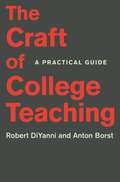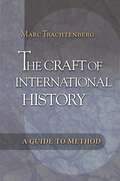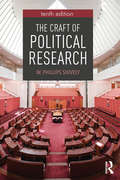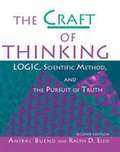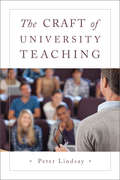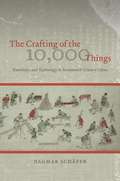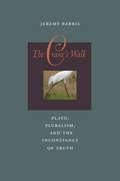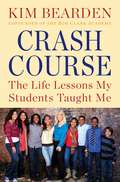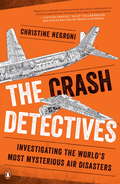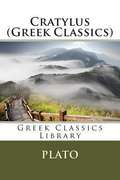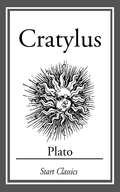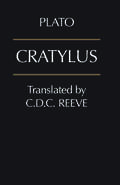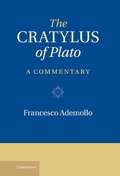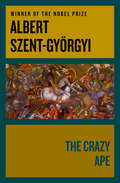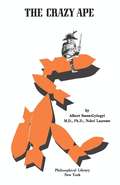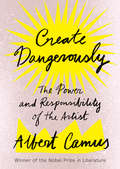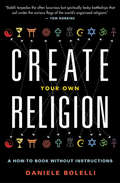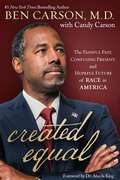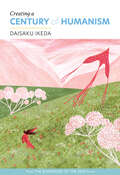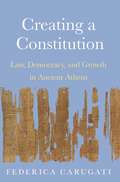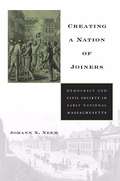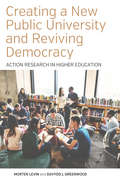- Table View
- List View
The Craft of College Teaching: A Practical Guide
by Robert DiYanni Anton BorstThe essential how-to guide to successful college teaching and learningThe college classroom is a place where students have the opportunity to be transformed and inspired through learning—but teachers need to understand how students actually learn. Robert DiYanni and Anton Borst provide an accessible, hands-on guide to the craft of college teaching, giving instructors the practical tools they need to help students achieve not only academic success but also meaningful learning to last a lifetime.The Craft of College Teaching explains what to teach—emphasizing concepts and their relationships, not just isolated facts—as well as how to teach using active learning strategies that engage students through problems, case studies and scenarios, and practice reinforced by constructive feedback. The book tells how to motivate students, run productive discussions, create engaging lectures, use technology effectively, and much more. Interludes between chapters illustrate common challenges, including what to do on the first and last days of class and how to deal with student embarrassment, manage group work, and mentor students effectively. There are also plenty of questions and activities at the end of each chapter.Blending the latest research with practical techniques that really work, this easy-to-use guide draws on DiYanni and Borst's experience as professors, faculty consultants, and workshop leaders. Proven in the classroom and the workshop arena, The Craft of College Teaching is an essential resource for new instructors and seasoned pros alike.
The Craft of International History: A Guide to Method
by Marc TrachtenbergThis is a practical guide to the historical study of international politics. The focus is on the nuts and bolts of historical research--that is, on how to use original sources, analyze and interpret historical works, and actually write a work of history. Two appendixes provide sources sure to be indispensable for anyone doing research in this area. The book does not simply lay down precepts. It presents examples drawn from the author's more than forty years' experience as a working historian. One important chapter, dealing with America's road to war in 1941, shows in unprecedented detail how an interpretation of a major historical issue can be developed. The aim throughout is to throw open the doors of the workshop so that young scholars, both historians and political scientists, can see the sort of thought processes the historian goes through before he or she puts anything on paper. Filled with valuable examples, this is a book anyone serious about conducting historical research will want to have on the bookshelf.
The Craft of Political Research
by W. Phillips ShivelyThe Craft of Political Research immerses readers not only in how political scientists work but also in how ideas produce research questions and guide the selection of research methods. Emphasizing the internal logic of research methods and the collaborative nature of the research process, this slender text explores the design behind interesting questions, problems in measurement and analysis, and key statistical methods. Brief and inexpensive to include in any course, The Craft of Political Research's elegant explanations inspire a big picture understanding of how political scientists explain political reality and encourage students to create their own inventive, original, and bold research work. Features include: Focuses on the big picture of how good research leads to good theories instead of just what research method to use. Provides concise and accessible coverage of key topics, including the nature of research, research design, sampling, statistical analysis, ethics, and more. Includes detailed examples of classic and contemporary political science research to give students models for their own original research.
The Craft of Power
by R. G. H. SiuThis book is directed primarily to executives seeking to expand their personal power. The book is a realistic description of the true nature of personal power as practiced and fought for in the competitive world of leaders, managers, and social activists and acts as a guide to influencing and managing organizations and people.
The Craft Of Thinking: Logic, Scientific Method And The Pursuit Of Truth
by Anibal Bueno Ralph EllisThe Craft of Thinking: Logic, Scientific Method and the Pursuit of Truth
The Craft of University Teaching
by Peter LindsayWhat does university teaching – as a craft – look like? What changes does a craft perspective suggest for higher education? The Craft of University Teaching addresses these questions in both a general sense – What does the act of teaching become when treated as a craft? What changes to a professor’s educational philosophy does it require? – and with respect to the practical, everyday tasks of university professors, such as the use and misuse of technology, the handling of academic dishonesty, the assignment of course reading, and the instilling of enthusiasm for learning. Intended for professors of all academic disciplines who either enjoy teaching or wish to enjoy it more, The Craft of University Teaching is a provocative and accessible book containing practical advice gleaned from the academic literature on pedagogy. In an era of increased bureaucratic oversight, rapidly diminishing budgets, and waves of technological distraction, The Craft of University Teaching provokes reflection on matters of pedagogy that are too often taken as settled. In so doing, it seeks to reclaim teaching as the intellectually vibrant and intrinsically rewarding endeavor that it is.
The Crafting of the 10,000 Things: Knowledge and Technology in Seventeenth-Century China
by Dagmar SchäferThe last decades of the Ming dynasty, though plagued by chaos and destruction, saw a significant increase of publications that examined advances in knowledge and technology. Among the numerous guides and reference books that appeared during this period was a series of texts by Song Yingxing (1587–1666?), a minor local official living in southern China. His Tiangong kaiwu, the longest and most prominent of these works, documents the extraction and processing of raw materials and the manufacture of goods essential to everyday life, from yeast and wine to paper and ink to boats, carts, and firearms. In The Crafting of the 10,000 Things, Dagmar Schäfer probes this fascinating text and the legacy of its author to shed new light on the development of scientific thinking in China, the purpose of technical writing, and its role in and effects on Chinese history. Meticulously unfolding the layers of Song’s personal and cultural life, Schäfer chronicles the factors that motivated Song to transform practical knowledge into written culture. She then examines how Song gained, assessed, and ultimately presented knowledge, and in doing so articulates this era’s approaches to rationality, truth, and belief in the study of nature and culture alike. Finally, Schäfer places Song’s efforts in conjunction with the work of other Chinese philosophers and writers, before, during, and after his time, and argues that these writings demonstrate collectively a uniquely Chinese way of authorizing technology as a legitimate field of scholarly concern and philosophical knowledge. Offering an overview of a thousand years of scholarship, The Crafting of the 10,000 Things explains the role of technology and crafts in a culture that had an outstandingly successful tradition in this field and was a crucial influence on the technical development of Europe on the eve of the Industrial Revolution.
The Crane's Walk: Plato, Pluralism, and the Inconstancy of Truth
by Jeremy BarrisIn The Crane's Walk, Jeremy Barris seeks to show that we can conceive and live with a pluralism of standpoints with conflicting standards for truth--with the truth of each being entirely unaffected by the truth of the others. He argues that Plato's work expresses this kind of pluralism, and that this pluralism is important in its own right, whether or not we agree about what Plato's standpoint is.The longest tradition of Plato scholarship identifies crucial faults in Plato's theory of Ideas. Barris argues that Plato deliberately displayed those faults, because he wanted to demonstrate that basic kinds of error or illogic have dimensions that are crucial to the establishing of truth. These dimensions legitimate a paradoxical coordination of logically incompatible conceptions of truth. Connecting this idea with emerging currents of Plato scholarship, he emphasizes, in addition to the dialogues' arguments, the importance of their nonargumentative features, including drama, myths, fictions, anecdotes, and humor. These unanalyzed nonargumentative features function rigorously, as a lever with which to examine the enterprise of rational argument itself, without presupposing its standards or illegitimately assimilating any position to the standards of another.Today, communities are torn apart by conflicts within and between a host of different pluralist and absolutist commitments. The possibility developed in this book-a coordination of absolute and relative truth that allows an understanding of some relativist and some absolutist positions as being fully legitimate and as capable of existing in a relation to their opposites-may contribute to perspectives for resolving these conflicts.
Crash Course: The Life Lessons My Students Taught Me
by Kim BeardenThe inspiring true story of a teacher’s experiences with her students and the life lessons she learned that can help others find joy and success.<P> Crash Course chronicles the life lessons that Kim Bearden has learned during an award-winning career in education that has spanned three decades. Kim has taught more than 2,000 students, and each has shown her something about the world and the abundant capacity for love, resilience, and appreciation that we all possess. By sharing her students’ stories, she teaches their inspiring lessons to us all.<P> Throughout the ups and downs of her professional and personal life, Kim found that her students were the light that illuminated her path; they were her sanctuary in the storm. From her challenges as a first year teacher, to her triumphs as the cofounder of the highly acclaimed Ron Clark Academy, Kim shares how children can teach each of us the importance of building relationships, abandoning fear, embracing one’s unique gifts, and living with passion.<P> Full of honesty, humor, heartbreak, and humanity, Kim’s experiences show how children can help any one of us, despite life’s obstacles, find the joy and significance in both our personal and professional lives.
The Crash Detectives: Investigating the World's Most Mysterious Air Disasters
by Christine Negroni"Negroni is a talented aviation journalist who clearly understands the critically important part the human factor plays in aviation safety." --Captain Chesley "Sully" Sullenberger, pilot of US Airways 1549, the Miracle on the HudsonOne of The Wall Street Journal's 3 Books Every Geek Should Read This FallA fascinating exploration of how humans and machines fail--leading to air disasters from Amelia Earhart to MH370--and how the lessons learned from these accidents have made flying safer. In The Crash Detectives, veteran aviation journalist and air safety investigator Christine Negroni takes us inside crash investigations from the early days of the jet age to the present, including the search for answers about what happened to the missing Malaysia Airlines Flight 370. As Negroni dissects what happened and why, she explores their common themes and, most important, what has been learned from them to make planes safer. Indeed, as Negroni shows, virtually every aspect of modern pilot training, airline operation, and airplane design has been shaped by lessons learned from disaster. Along the way, she also details some miraculous saves, when quick-thinking pilots averted catastrophe and kept hundreds of people alive. Tying in aviation science, performance psychology, and extensive interviews with pilots, engineers, human factors specialists, crash survivors, and others involved in accidents all over the world, The Crash Detectives is an alternately terrifying and inspiring book that might just cure your fear of flying, and will definitely make you a more informed passenger."Christine Negroni combines her investigative reporting skills with an understanding of the complexities of air accident investigations to bring to life some of history's most intriguing and heartbreaking cases." --Bob Woodruff, ABC News From the Trade Paperback edition.
Cratylus
by PlatoMost modern scholars agree that it was written mostly during Plato's so-called middle period.[1] In the dialogue, Socrates is asked by two men, Cratylus and Hermogenes, to tell them whether names are "conventional" or "natural", that is, whether language is a system of arbitrary signs or whether words have an intrinsic relation to the things they signify.
Cratylus
by PlatoThe Cratylus, Plato's sole dialogue devoted to the relation between language and reality, is acknowledged to be one of his masterpieces. But owing to its often enigmatic content no more than a handful of passages from it have played a part in the global evaluation of Plato's philosophy. This new English translation by C D C Reeve is the first since 1926, and incomparably the most helpful and accessible now available. It opens up the Cratylus to all philosophically interested readers, as well as to cultural historians and to those whose primary concern is the history of linguistics. The full and lucid introduction does much to illuminate the internal dynamic of this important text and to explain its place within Plato's oeuvre.
Cratylus
by Plato C. D. Reeve"It is. . . remarkable that Reeve's is the first new English translation since Fowler's Loeb edition of 1926. Fortunately, Reeve has done an excellent job. His version is not slavishly literal but is in general very accurate. It is also very clear and readable. Reeve is particularly to be congratulated for having produced versions of some of the more torturous passages, which are not only faithful to the text but also make good sense in English. The long and detailed introduction is worth reading in its own right." --R. F. Stalley, The Classical Review
The Cratylus of Plato
by Francesco AdemolloThe Cratylus, one of Plato's most difficult and intriguing dialogues, explores the relations between a name and the thing it names. The questions that arise lead the characters to face a number of major issues: truth and falsehood, relativism, etymology, the possibility of a perfect language, the relation between the investigation of names and that of reality, the Heraclitean flux theory and the Theory of Forms. This is the first full-scale commentary on the Cratylus and offers a definitive interpretation of the dialogue. It contains translations of the passages discussed and a line-by-line analysis which deals with textual matters and unravels Plato's dense and subtle arguments, reaching a novel interpretation of some of the dialogue's main themes as well as of many individual passages. The book is intended primarily for graduate students and scholars, both philosophers and classicists, but presupposes no previous acquaintance with the subject and is accessible to undergraduates.
The Crazy Ape: Written by a Biologist for the Young
by Albert Szent-GyörgyiA Nobel Prize winner, Dr. Szent-Györgyi concerns himself with the underlying forces and conditions that have prevented the realization of the higher possibilities of the American Dream, and, by extension, of all mankind. He addresses himself especially to the youth of the world in his attempt to show how man, the more he progresses technologically, seems the more to regress psychologically and socially, until he resembles his primate ancestors in a state of high schizophrenia. The fundamental question asked by this book is: why is it that most of the scientific research that is done to elevate human life serves in the end to destroy it? That this phenomenon exists is unarguable. How to alter it is the problem the author tackles. He finds the possibility, indeed the instrument of our survival, in our youth. Dr. Szent-Györgyi calls upon the youth the world over to organize and exercise their power to create a new world. He implores them not to waste their energies in petulance and frustration—the world is ripe for the radical changes needed for man&’s survival, and for youth to fritter away their opportunity would be to compound the tragedy and seal the fate of mankind.
The Crazy Ape: Written by a Biologist for the Young
by Albert Szent-GyörgyiA Nobel Prize winner, Dr. Szent-Györgyi concerns himself with the underlying forces and conditions that have prevented the realization of the higher possibilities of the American Dream, and, by extension, of all mankind. He addresses himself especially to the youth of the world in his attempt to show how man, the more he progresses technologically, seems the more to regress psychologically and socially, until he resembles his primate ancestors in a state of high schizophrenia. The fundamental question asked by this book is: why is it that most of the scientific research that is done to elevate human life serves in the end to destroy it? That this phenomenon exists is unarguable. How to alter it is the problem the author tackles. He finds the possibility, indeed the instrument of our survival, in our youth. Dr. Szent-Györgyi calls upon the youth the world over to organize and exercise their power to create a new world. He implores them not to waste their energies in petulance and frustration—the world is ripe for the radical changes needed for man&’s survival, and for youth to fritter away their opportunity would be to compound the tragedy and seal the fate of mankind.
The Crazy Ape
by Szent-Györgyi AlbertA Nobel Prize winner, Dr. Szent-Gyorgyi concerns himself with the underlying forces and conditions that have prevented the realization of the higher possibilities of the American Dream, and, by extension, of all mankind. He addresses himself especially to the youth of the world in his attempt to show how man, the more he progresses technologically, seems the more to regress psychologically and socially, until he resembles his primate ancestors in a state of high schizophrenia. The fundamental question asked by this book is: Why is it that most of the scientific research that is done to elevate human life serves in the end to destroy it? That this phenomenon exists is unarguable. How to alter it is the problem the author tackles. He finds the possibility, indeed the instrument of our survival, in our youth. Dr. Szent-Gyorgyi calls upon youth the world over to organize and exercise their power to create a new world. He implores them not to waste their energies in petulance and frustration the world is ripe for the radical changes needed for man s survival, and for youth to fritter away their opportunity would be to compound the tragedy and seal the fate of mankind. Born into the fourth generation of a noted family of scientists in Hungary, Albert Szent-Gyorgyi decided at an early age to devote his life to biological research. As a medical student he required international recognition for his studies in microscopic anatomy. The First World War, which he spent in the service of the Austro-Hungarian army, caused a break in his career. After the war he left his devastated country to work for ten years in various countries, notably Germany, Holland, England and the United States. He then returned to his native Hungary to help rebuild science there. In 1937, he won the Nobel Prize for his studies on metabolism and for the discovery of ascorbic acid (Vitamin C). He soon found himself in conflict with the growing movement of Nazism, was arrested, escaped, and was hunted for years by the secret service of Hitler. After World War II, disappointed by Soviet colonialism and the terrorist methods of Stalin, he left Hungary and found refuge at the Marine Biological Laboratory of Woods Hole, Massachusetts.
Create Dangerously: The Power and Responsibility of the Artist
by Albert Camus“To create today means to create dangerously. Every publication is a deliberate act, and that act makes us vulnerable to the passions of a century that forgives nothing.” In 1957, Nobel Prize-winning philosopher Albert Camus gave a speech entitled "Create Dangerously," effectively a call to arms for artists, in particular those who came from an immigrant background, like he did. Camus understood the necessity of those making art as a part of civil society. A bold cry for artistic freedom and responsibility, his words today remain as timely as ever. In this new translation, Camus's message, available as a stand-alone little book for the first time, will resonate with a new generation of writers and artists.
Create Your Own Religion: A How-To Book Without Instructions
by Daniele Bolelli&“One of the most refreshing, humorous, and radically honest books about practical and comparative religion this reviewer has ever come across.&”—Library Journal (starred review) Create Your Own Religion is a call to arms—an open invitation to question all the values, beliefs, and worldviews that humanity has so far held as sacred in order to find the answers we need to the very practical problems facing us. Writer, philosopher, and professor of comparative religion, Daniele Bolelli, leads the reader through three thousand years of mythology, misogyny, misinformation, and the flat-out lies about &“revealed truth&” that continue to muddle our ability to live a peaceful life, free of guilt and shame and the ultimate fear of death. &“Our worldviews are in desperate need of some housecleaning,&” says Bolelli. &“We enter the 21st century still carrying on our backs the prejudices and ways of thinking of countless past generations. What worked for them may or may not still be of use, so it is our job to make sure to save the tools that can help us and let go of the dead weight.&” &“With a cheerful, good-natured smile, Daniele Bolelli torpedoes the often luxurious but spiritually leaky battleships that sail under the various flags of the world&’s organized religions.&”—Tom Robbins, New York Times bestselling author &“Daniele Bolelli is in the house. Minds will be blown. Lives will be changed.&”—Joe Rogan, comedian and podcast host &“Bolelli&’s direct confrontation with dogma without giving an inch and without prescribing a new dogma is about as fresh as it gets.&”—Mike Vallely, skateboarder, musician, and actor
Created Equal: The Painful Past, Confusing Present, and Hopeful Future of Race in America
by Ben CarsonIn this inspiring New York Times bestseller, conservative icon Dr. Ben Carson lays out a hopeful road map for how America can come together. External physical characteristics that are genetically encoded are things over which no individual has control. But rather than appreciating the gift of diversity, some have chosen to use it to drive wedges between groups of people. Some of these external characteristics are associated with the past moral failing of slavery. Though slavery in America formally ended in the 1860s, the vestiges of that evil institution are still with us today, and those vestiges often inflict guilt on some and facilitate feelings of victimhood in others. In Created Equal, Dr. Carson uses his own personal experiences as a member of a racial minority, along with the writings and experiences of others from multiple backgrounds and demographics, to analyze the current state of race relations in America. Instead of using race as an excuse to remake America into something completely antithetical to the Constitution, Dr. Carson suggests ways to enhance and bring great success to our nation and all multiethnic societies by magnifying America's incredible strengths instead of her historical weaknesses.
Created from Animals: The Moral Implications of Darwinism
by James RachelsCreated from Animals offers a provocative look at how Darwinian evolution undermines many tenets of traditional philosophy and religion. James Rachels begins by examining Darwin's own life and work, presenting an astonishingly vivid and compressed biography. We see Darwin's studies of the psychological links in evolution (such as emotions in dogs, and the "mental powers" of worms), and how he addressed the moral implications of his work, especially in his concern for the welfare of animals. Rachels goes on to present a lively and accessible survey of the controversies that followed in Darwin's wake, ranging from Herbert Spencer's Social Darwinism to Edward O. Wilson's sociobiology, and discusses how the work of such influential intellects as Descartes, Hume, Kant, T.H. Huxley, Henri Bergson, B.F. Skinner, and Stephen Jay Gould has contributed to--or been overthrown by--evolutionary science.
Creating a Century of Humanism
by Daisaku IkedaFor these troubled and confusing times, Buddhist philosopher Daisaku Ikeda offers advice on how to bring harmony, hope, and assurance to all people. These five brief lectures on Nichiren' s writings delve into key concepts such as respecting all people, showing through our own lives the power of Buddhist practice, and what it means to champion human dignity.
Creating a Constitution: Law, Democracy, and Growth in Ancient Athens
by Federica CarugatiA comprehensive account of how the Athenian constitution was created—with lessons for contemporary constitution-buildingWe live in an era of constitution-making. More than half of the world's constitutions have been drafted in the past half-century. Yet, one question still eludes theorists and practitioners alike: how do stable, growth-enhancing constitutional structures emerge and endure? In Creating a Constitution, Federica Carugati argues that ancient Athens offers a unique laboratory for exploring this question. Because the city-state was reasonably well-documented, smaller than most modern nations, and simpler in its institutional makeup, the case of Athens reveals key factors of successful constitution-making that are hard to flesh out in more complex settings.Carugati demonstrates that the institutional changes Athens undertook in the late fifth century BCE, after a period of war and internal strife, amounted to a de facto constitution. The constitution restored stability and allowed the democracy to flourish anew. The analysis of Athens's case reveals the importance of three factors for creating a successful constitution: first, a consensus on a set of shared values capable of commanding long-term support; second, a self-enforcing institutional structure that reflects those values; and, third, regulatory mechanisms for policymaking that enable tradeoffs of inclusion to foster growth without jeopardizing stability.Uniquely combining institutional analysis, political economy, and history, Creating a Constitution is a compelling account of how political and economic goals that we normally associate with Western developed countries were once achieved through different institutional arrangements.
Creating a Nation of Joiners: Democracy and Civil Society in Early National Massachusetts
by Johann N. NeemThe book explores the multiple conflicts that produced a vibrant pluralistic civil society following the American Revolution. The story Neem tells is more pertinent for Americans and for those seeking to build civil societies around the world.
Creating a New Public University and Reviving Democracy: Action Research in Higher Education (Higher Education in Critical Perspective: Practices and Policies #2)
by Morten Levin Davydd J. GreenwoodPublic universities are in crisis, waning in their role as central institutions within democratic societies. Denunciations are abundant, but analyses of the causes and proposals to re-create public universities are not. Based on extensive experience with Action Research-based organizational change in universities and private sector organizations, Levin and Greenwood analyze the wreckage created by neoliberal academic administrators and policymakers. The authors argue that public universities must be democratically organized to perform their educational and societal functions. The book closes by laying out Action Research processes that can transform public universities back into institutions that promote academic freedom, integrity, and democracy.
